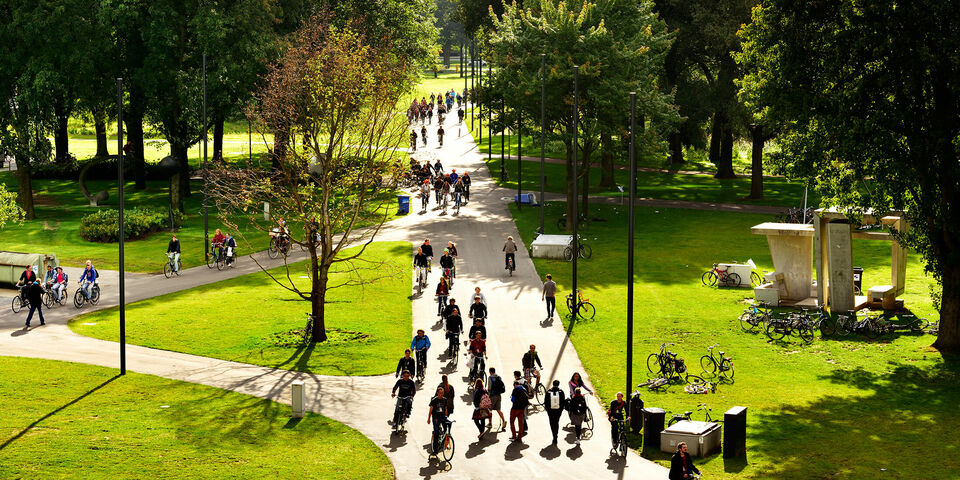TU/e officially recognized as ‘bicycle-friendly’
TU/e will receive a ‘bicycle-friendly campus’ certificate from the Dutch Cyclists’ Union tomorrow, May 14. That day, a so-called bicycle counter, a device for monitoring cycling flows, will be officially launched at the outskirts of campus near Kennispoort as well. The fact that the university allows cyclists to park their bicycles near the university’s buildings, discourages the use of cars, and stimulates sustainable transportation alternatives on campus, such as bicycles, were important reasons for granting the certificate, which the university itself applied for.
“We wanted to raise awareness of our mobility policy with this certificate, and we wanted the union’s advice on what we could possibly further improve.” This is how Simone Vonken, policy advisor at Internal Affairs, explains the choice for applying for the certificate.
In order to qualify, at least three company employees need to fill out a checklist that includes questions on communication, the organization and infrastructure, and the handling of ‘visitors.’ Traffic safety is not addressed. Subsequently, the Dutch Cyclists’ Union conducts practice tests with these answers. The tests include questioning people on campus and assessing daily practice.
Image of sustainability
“To us, this certificate acknowledges the fact that we have successfully carried out the mobility policy we implemented some years ago,” Vonken says. “It is in line with the image of sustainability TU/e wants to project.” The university primarily owes the certificate to its bicycle plan, its commuting expenses, the renewed bicycle stands, and the possibility of parking close to the university buildings. “The fact that terrain stewards are active on campus played a role as well,” Vonken says.
The university scored well on several issues; the only thing that needed some improvement was communication, according to Vonken. “We could do more to bring our bicycle arrangements under the attention, of new employees in particular. Our working group ‘Bicycle and car parking’ already makes an assessment of all the needs, and we take this into account. One of the things we want to introduce in several buildings shortly, based on the advice of the cyclists’ union and the responses from our staff, are lockers for wet cycling clothes.”
Nicole Ummelen, vice president of the Executive Board, says “the mobility policy is in line with our core value ‘sustainability’, as defined in our strategic plan. We feel a responsibility for a habitable and healthy society, and we gladly contribute to this. Sustainability is an important issue to TU/e, not just in our education and research, but in our operational management as well. The mobility plan is an example of this.”
Bicycle counter
The Dutch Cyclists’ Union hands out bronze, silver, and gold certificates. TU/e will receive a certificate in the highest of these categories. Nicole Ummelen will be presented with the certificate by Max Mooij of the Dutch Cyclists’ Union. That same afternoon, the municipality of Eindhoven, TU/e, and the Dutch Cyclists’ Union will launch a bicycle counter near the Limbopad. The municipality already placed six of these devices at several locations in the city in order to gain insight into the cycling flows in Eindhoven. The devise will monitor data such as speed and bicycle use on campus.
What do students think?
We asked some students if they also find TU/e bicycle-friendly. Stefan Rademakers is a bachelor’s student at the Department of Biomedical Engineering and happens to sit on the bicycle commission of European student organization AEGEE. Bicycles that are intended for international students on campus often need to be repaired. “The university is very cooperative,” he says, “they let us know where we can get the bicycles fixed, and we were able to loan some tools from security recently.”
He himself is happy that he can always store his bike somewhere, both secured and unsecured. “I don’t expect many students to store their bicycles in the secured area, and perhaps they are unaware of this possibility. But I find it quite practical sometimes. Also, they always announce it clearly and in time when they are going to remove bicycles.”
Daniëlle Herlaar and Kristel van der Koppel, Operations Management and Logistics students, feel positive about the number of bicycle storage facilities and the excellent accessibility as well. They only have a few small suggestions for improvement. Herlaar: “When I’m at the University at night, I often see that the bicycle storage is still occupied for fifty percent with a lot of bicycles that are probably never used. It wouldn’t hurt if they removed these bicycles a bit more often.” Van der Koppel, who usually takes the car: “A loan bicycle would have come in handy when I was still at the IPO building.”
Jesper Huisink, bachelor’s student at the Department of Electrical Engineering, will not be deterred from taking the car to campus. “I live in Middelbeers, which is 19 kilometers from campus. Travelling with public transport is inconvenient, and it’s too far to cycle.”


Discussion